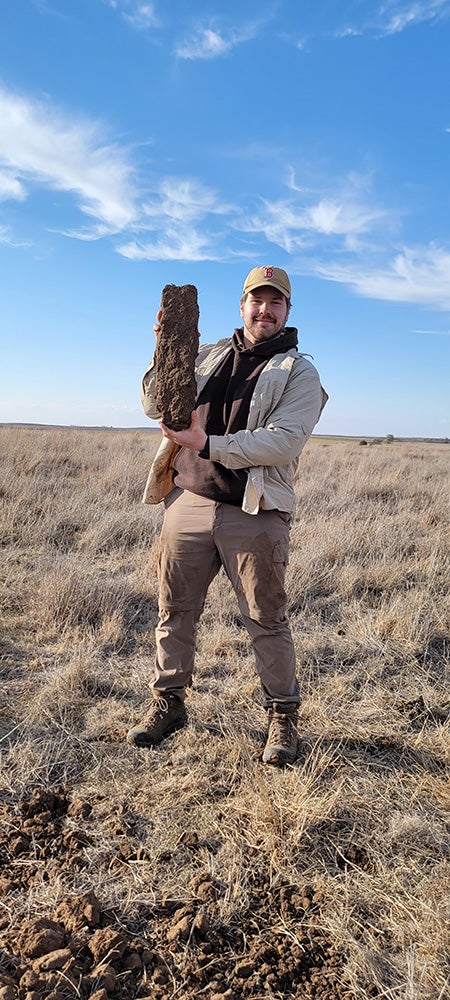This past spring in Oklahoma, Braden Fleming could hardly believe his ears when the judges announced him as the first-place winner for the individual competition at the National Collegiate Soil Judging Competition. “It was special, it really was. It was one of the most proud and exciting moments I have ever had,” said Fleming.
Fleming graduated from URI in the winter of 2022 with a degree in Environmental Science and Management. After graduating high school and before enrolling at URI, he took some classes at the University of Vermont and worked for about a year and a half. Even though he had some diverse experiences working manual labor jobs, Fleming knew that he wanted to pursue an environmental field. “I’ve always been an outdoorsy person,” he said, “so environmental science had always been on my mind.”
Fleming’s time in the working world allowed him to tackle his college coursework with a fresh perspective. “I was confident that I knew what I wanted to do. I had a bit more determination to succeed,” he said. “I treated school more like it was a job. Some days you’re going to be there for twelve hours and it’s okay. I knew what I had to do to succeed and I was going to do it.”
Fleming started at URI during the spring 2020 semester, just as the COVID-19 pandemic was unfolding. Despite the transition to online learning, he maintained his sense of determination and purpose. “I was definitely ready to be back in school and finish what I started,” he said. The pandemic taught Fleming a valuable lesson: “Networking is everything.” Fleming managed to find ways of connecting with professors, asking questions, and learning more about his interests. He took an introductory natural resources science class with Brett Still and spoke to him about his interests. Still, a clinical assistant professor of natural resource science advised Fleming to take soil science classes and GIS classes.
Fleming was looking for hands-on experience, so he enrolled in a soil judging course taught by Mark Stolt, a professor of natural resource science. As part of the course, students are able to compete in the Northeast Soil Judging Competition and qualify for the National Collegiate Soil Judging Competition. In exploring a new subject area, he found a passion. “I didn’t go to URI with the intention of doing soil science,” he said. “Soil judging was the deciding factor that made me want to do it.” Fleming’s drive was apparent to Stolt and to his teammates. “Braden is a strong student, understanding that it takes more than the time I spend teaching them, but they need to reinforce their lessons on their own. So instead of relaxing after a long practice day in the field, Braden encouraged the team to practice their soil texturing skills to be better soil judges,” Stolt said.
Fleming participated in the regional and national soil judging competitions in 2022 and 2023. Both regional competitions took place in Pennsylvania. “The soils are nothing like what they are here in Rhode Island, so there’s only so much you can prepare,” Fleming commented, explaining how much of the soil judging course revolved around how to use the soil guidebook to identify soils on the spot. “To attend the national contest each team must qualify at their regional contest,” explained Stolt. “These 20 to 25 teams that qualify from across the country bring as many as 10 students to the contest and then choose the best four students to participate in the individual part of the contest.”
At the 2022 national competition, URI finished second in the group division of the competition and sixth overall. At the 2023 national competition in Oklahoma, Fleming hoped to come in the top ten for the individual division. “I hold myself to fairly high expectations. My goal essentially was that I really wanted to finish in the top ten, and maybe that had to do with proving to myself that all this time I have spent doing this and learning has paid off,” he said. Having watched Fleming grow as a student, Stolt was very confident in Fleming’s abilities. “He understood that this is his chance, his time, to represent his chosen school at a national academic event,” Stolt said. “He wanted to be proud of his efforts and of his team.”
To gain more practical experience beyond soil judging, Fleming worked as a Pathways intern for the Natural Resource Conservation Service. The program gives college students the opportunity to work for the organization and transition to full-time employment if they choose after working 640 hours. The internship exposed Fleming to the two main branches of work as a soil scientist. “Within the NRCS for soil science, there’s the state side, or the resource soil science, and then soil survey,” said Fleming. “I ended up really liking the soil survey side, and that’s what I decided to stick with.” Now, after completing the Pathways program and graduating, Fleming is a soil scientist for the special projects office for the Natural Resources Conservation Service. He is out in the field doing soil surveys and currently working on a congressionally funded project mapping Long Island Sound.
Soil science is not an area of study that is as popular as other natural sciences. However, Fleming found his home through asking questions and being determined to follow his interests. He advises other students to do the same. “If you have interests’ it’s worth speaking to people about them,” Fleming says. In Fleming’s case, aiming high meant learning about the world beneath his feet.
By Sarah Heavren, CELS Communication Fellow

